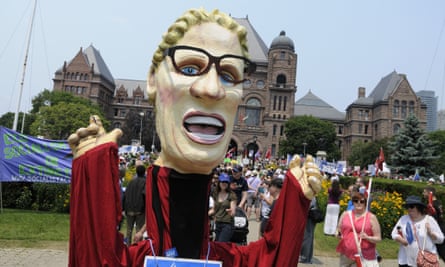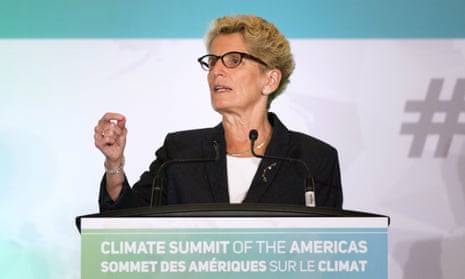The leader of Canada’s biggest province has escalated her feud with the country’s prime minister, accusing Stephen Harper of obstructing efforts to fight climate change and calling on Canadians to make global warming a decisive issue in the coming elections.
In an interview with the Guardian, Kathleen Wynne, the Liberal premier of Ontario, brought long-simmering tensions with Harper over energy and economic policy to a rollicking boil, repeatedly calling out the Conservative prime minister for blocking efforts to cut carbon pollution.
When it came to fighting climate change, Harper was an obstruction rather than a help, she said.
“There isn’t a collaborative process around any of this, and that is a real problem because it means that we are not supporting each other and we are not pushing each other in a constructive way. It is very confrontational,” she said.
“We are taking action in spite of [the federal government], quite frankly,” Wynne said. “The federal government at this point is just not helpful.”
Despite her strong language, Wynne opposes a ban on new projects and pipelines in the Alberta tar sands – the fastest-growing source of Canada’s greenhouse gas emissions, and the reason Canada is the only industrialised country to fall short of its emissions targets.

The Ontario premier reached an agreement with other provincial leaders on Friday that campaigners said would expand tar sands pipelines without sufficient protections for the environment. The new national energy strategy does not include targets for reducing greenhouse gas emissions.
In his nine years as prime minister, Harper has vigorously promoted the tar sands, presiding over an expansion of production and lobbying for more exports and pipelines to build up Canada into his vision of an energy superpower.
But Harper’s vision for Canada ran into growing international criticism of the country’s rising greenhouse gas emissions, and exposed the economy to the volatility of global oil prices.
In the run-up to the 19 October election, opinion polls show Harper trailing or tied with the leftwing New Democratic party, and Wynne’s Liberal party – which is led at federal level by Justin Trudeau – coming in third in a tight race.
Speaking on the sidelines of the Climate Summit of the Americas in Toronto last week, Wynne added to growing criticism of Harper’s economic and environmental policies, saying that the prime minister was not a partner in the fight against climate change.
“I think there is a lot more that he can do. I think the position that the federal government has taken has not been helpful,” Wynne said.
“That’s not news to anyone, because the fact that I have been calling for a partner, and the fact that we have been saying we need the federal government to be working with us and to be doing more, that’s public knowledge,” she went on. “That call is born out of my disappointment at what the federal government has been doing.”
She noted that Harper had failed to either attend the regional climate meeting or to send Leona Aglukkaq, the environment minister. Harper also stayed away from the premiers’ meeting on Friday.

Wynne called on Canadians to vote on climate change in the October elections. “I hope that climate change and taking action on climate change is an election issue,” she said.
As premier, Wynne has championed the efforts of Ontario and other provinces to deal with climate change. Last week’s meeting of 22 states, provinces and territories called for setting a price on carbon.
Ontario won positive attention when it phased out the use of coal in its power plants last year.
But the environmental commissioner said on 7 July that the province would have to do much more to meet its 2020 target for cutting greenhouse gas emissions.
Wynne’s advisers said she hoped to cut carbon pollution from transport by investing in public transit and easing congestion.
Climate change looms even larger over Harper, who faces increasing criticism at home and abroad tying Canada’s economic future to the development of the tar sands.
At international climate conferences, the Harper government now is routinely handed out mock “fossil” awards for its failure to deal with climate change. Campaigners have accused Harper of treading on the rights of government scientists.
The expansion of Alberta’s tar sands production on Harper’s watch has turned Canada into the world’s biggest carbon polluter on a per capita basis, according to the World Resources Institute, a respected environmental thinktank.
Wynne said Canada should have put forward a more ambitious climate pledge ahead of the UN negotiations in Paris.
Canada will not meet its 2020 target for cutting emissions because of the tar sands, and it has retreated still further from those earlier promises in its pledge ahead of the Paris climate talks.

Economists and energy experts have said that Canada cannot hope to meet its climate commitments without tackling the tar sands.
But Wynne – although she acknowledged findings by scientists that the majority of those deposits needs to stay in the ground to avoid catastrophic climate change – rejected the idea of a ban on new production.
“I don’t think we can pretend that making some kind of unilateral federal government decision around Alberta’s economy at this point would be a) that it’s possible or b) that it would be helpful,” she said.
Campaigners needed to recognise that “fossil fuels will be with us for some time”, she said.

Comments (…)
Sign in or create your Guardian account to join the discussion